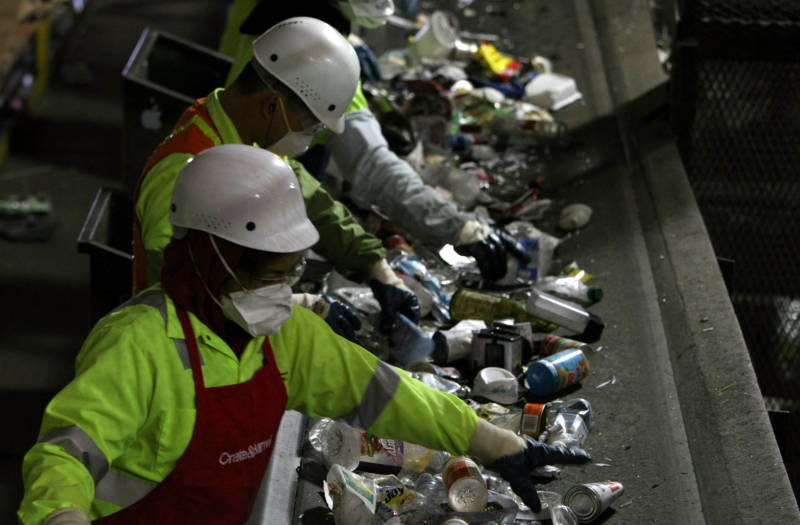A leading trade group, the Grocery Manufacturers Association, asserted the bill didn’t do enough to fix the state’s strained recycling infrastructure.
“We remain committed to the aspects of the bill regarding recycling and compostability,” said John Hewitt, director of state affairs for the association. “And we are committed to working with the Legislature on the funding and infrastructure components of the bill. We want to see something that works for California.”
The industry association represents some of the largest food brands in the country, including General Mills and Land O’Lakes. In late August, the lobby signaled it was open to a compromise, but the group was unhappy with September changes that it said dramatically expanded the bill’s scope.
“Everybody supported the broad concepts of recyclability and compostability,” Hewitt said. But he said the groups split on the issue of how to invest in the state’s recycling infrastructure.
‘An Amateur Move’
The outcome of all the legislative wrangling was unclear until the last moments of the session, says Mark Murray, executive director of the environmental organization Californians Against Waste, which lobbied for the bills’ passage.
Murray said the fate of the proposal was sealed with a series of amendments introduced at the request of Gov. Gavin Newsom’s office. The changes triggered an exodus of support from recyclers and waste haulers, including Waste Management and Waste Connections.
The amendments from the administration were late, Murray said, and stakeholders did not have enough time to review them before the session ran out. “In the end, we were fighting amongst ourselves because of well-intended but poorly crafted language from the administration,” he said.
“Honestly, it was an amateur move. They needed to get their shit together earlier. And get amendments to the Legislature before the last week of the legislative session. We should have had that language in the beginning of August.”
Murray called the lack of a vote a setback. “Sadly the issue of plastic pollution is a problem that is only getting worse.”
Shester agrees the timing of the bill’s amendments meant a vote couldn’t take place until the final day of the session. But he doesn’t pin the blame on Newsom. He says some of the changes were introduced to address concerns from business and other groups.
But what ultimately doomed the plan, for this year anyway, Shester says, was the plastic industry jumping on the late amendments to cast doubt and argue that the bill wasn’t ready.
“There were a number of changes made close to the end. It confused some legislators and allowed the industry to seize on it and create a perception that it wasn’t fully cooked.”
In an email, Vicky Waters, a spokesperson for Newsom, responded to criticism over the late changes by saying that Newsom “would like to see a meaningful paradigm shift for single-use packaging manufacturing, reuse, recycling and composting that would fundamentally change the way we do recycling in California. He looks forward to seeing legislation on his desk soon after the Legislature returns in January that accomplishes that.”
The American Chemistry Council originally opposed the plan, but the group, which represents companies that make plastic, switched its position to neutral during the end of session.
Keith Christman, managing director of plastic markets at the American Chemistry Council’s Plastics Division, said the organization supports the broad goals of the plan and is “looking forward to working with the bill sponsors in January to resolve the remaining issues.”
“We all have to admit a challenge is the funding for the legislation,” he said. “One of the things that is going to be needed to make the legislation work is investment in recycling and composting infrastructure. “
The council has set a goal of reducing, reusing or recycling 100% of plastic packaging by 2040, Christman said.
Ron Fong, president and CEO of the California Grocers Association, which announced its support after originally opposing the measure, said the discussions around reducing plastic waste have been positive.
“Everyone is discussing what a January bill should look like,” he said.
But environmental groups are huddling to discuss their next moves. Murray said that if the Legislature cannot put regulations in place, supporters will push a single-use plastic ban in a 2020 ballot measure.
